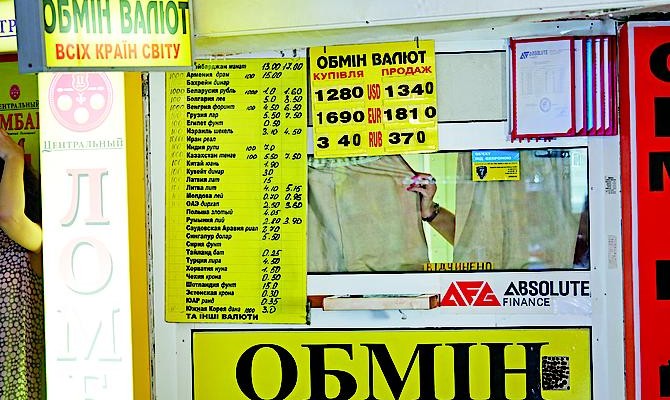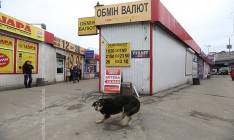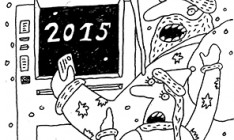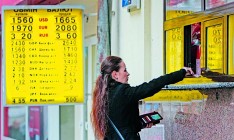Economy
currencyManual control of the rate by the NBU revived the black market

After nearly a four-year hiatus, the National Bank of Ukraine held the first auction for the sale of currency on September 8. The central bank had hoped that this instrument would knock down the demand for dollars on the part of commercial banks and would allow for strengthening control over the hryvnia exchange rate. Yesterday, at the first auction together with currency interventions on the interbank exchange the NBU sold US $93.89 mn from its reserves. However, appearance of the NBU on the market had the opposite result of what was expected. The interbank closed with a hryvnia decline by UAH 0.22. According to InterBusinessConsulting, dollar trading closed within the range of UAH 12.90-13.20/US $1. The central bank reduced the official rate of the national currency by UAH 0.1.
Effect for the future
Under conditions of the auction, each bank had the right to submit one bid for no less than US $1 mn with specification of the target needs. The currency purchased at the auction must be used for the specified purpose over 5 working days upon placement of the funds to the corresponding account of an authorized bank. The tough conditions set by the NBU did not raise hype among the financial institutions. According to the NBU, only nine financial institutions submitted bids for the auction according to which dollars were sold at UAH 12.9/USD.
President of the Ukrainian Analytical Center Oleksandr Okhrymenko believes the effect from the renewed practice of currency auctions will be insignificant. The expert believes that the tough requirements that the NBU set for the auctions do not create stimulus for the market to participate in them. “The banks are in dire need of hard currency, but the NBU cannot sell a lot of it. That gives a kick-start to manual management, when financial institutions are given verbal instructions as to who can submit bids, how many and at what price. This is not a market, but manual control of the exchange rate,” the expert notes.
Manual control of the currency market by the NBU already led to the formation of the shadow market. The expert says that at the auction the dollar was offered at UAH 12.9, while on the black market it cost around UAH 14. Banks asked by Capital do not want to officially speak about the presence of the double rate. Unofficially, however, they admit that there are such offers on the market. Yesterday, in a number of Kyiv’s currency exchange counters major currency transactions were conducted at UAH 13.7/USD (purchase) and UAH 14.1/USD (sale). At the same time, it was impossible to purchase even small amounts of dollars at UAH 12.9 at the banks that offered such quotations.
Interestingly, NBU Governor Valeriya Hontareva also indirectly admitted that the currency market was moving into the shadows. Yesterday, at a round table with bankers she said that today’s volume of the interbank exchange of Ukraine amounts to only US $200-300 mn per day. “For a country with a population of 45 mn, I would say this is simply inappropriate,” emphasized Hontareva, blaming the introduction of the pension fee charged for the purchase of currency, which was introduced on April 1.
Hontareva said that prior to the introduction of the pension fee, the market volume was US $1.2-1.3 bn. “This is turning our market into a fully unbalanced condition. And because of this we have the imbalances that you have all observed. The swings of the currency exchange rate can be provoked by transactions in the amount of US $50,000,” explained Hontareva.
Besides the pension fee, the NBU governor also unexpectedly criticized another recent decision of the regulator. She said that the increase of the mandatory sale of currency earnings from 50% to 100% by the NBU showed that the Ukrainian exporters that “can hide 50% of the earnings can just as successfully hide 100%”. Meanwhile, unlike the pension fee, there is no talk about cancellation of this norm – the NBU plans to fight concealing of currency earnings by analyzing supposed transactions.
Despite the poor results of the first currency auction, the NBU confirmed its intention to hold them on a regular basis. “The NBU expects that target auctions will help create stimuli for stable strengthening of the national currency rate and securing of positive trends on the currency market,” the press service quoted Hontareva as saying. Earlier, the NBU governor said that the balanced rate is UAH 11.5-11.9/US $1.
Senior analyst at the International Centre for Policy Studies Oleksandr Zholud believes the effectiveness of the auctions will depend on the NBU’s readiness to sell sufficient amounts of currency at them. “If the regulator decides to hold auctions and provide the banks with continuous dollar liquidity, this will definitely influence the rate. The question, however, is how often will the NBU be able to hold regular auctions of significant volumes now, taking into account the agreements of Ukraine with the IMF as to the limit of the NBU reserves,” noted Zholud.
Currency auctions are not the only ace up the NBU’s sleeve. Yesterday, Hontareva informed that the NBU has been discussing the idea of market makers for two weeks. It is assumed that 15 market makers will support “very solid quotations with a very narrow spread”, she said. The new concept should be introduced within several weeks. Meanwhile, the NBU governor did not specify where the currency for sale at “solid quotations” will come from.






 of the agreement of syndication with Financial Times Limited are strictly prohibited. Use of materials which refers to France-Presse, Reuters, Interfax-Ukraine, Ukrainian News, UNIAN agencies is strictly prohibited. Materials marked
of the agreement of syndication with Financial Times Limited are strictly prohibited. Use of materials which refers to France-Presse, Reuters, Interfax-Ukraine, Ukrainian News, UNIAN agencies is strictly prohibited. Materials marked  are published as advertisements.
are published as advertisements.